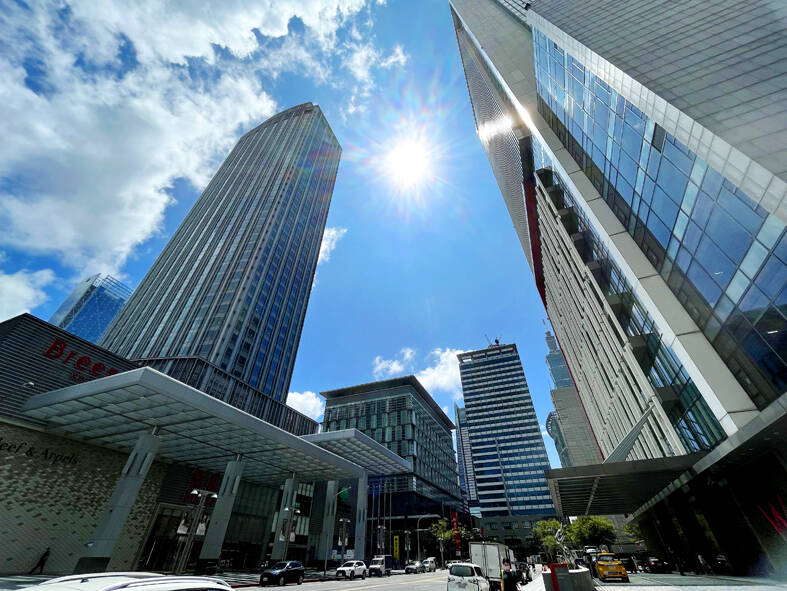The vacancy rate for Grade-A offices in Taipei last quarter rose 0.5 percentage points, while rents climbed to a record NT$3,279 per ping (3.3m2), as demand remained healthy, property consultancy REPro Knight Frank (瑞普萊坊) said on Tuesday.
Despite the uptick, the 6.4 percent vacancy rate during the April-to-June period is lower than the 20-year average and Taipei ranked the fourth-best performer in the Asia-Pacific region, after Seoul’s 1.5 percent, Tokyo’s 4.3 percent and Singapore’s 5 percent, the international broker said.
The uptrend in office rents is due to inflation and the growing importance corporations assign to modern office spaces that can help boost work efficiency and meet environmental friendliness and energy conservation requirements, it said.

Photo: Hsu Yi-ping, Taipei Times
A total of 55,000 ping of new office spaces would join the market in central business districts later this year, aided by the government’s efforts to facilitate urban renewal projects and retire old and dilapidated buildings, it said.
Developers have responded, taking advantage of favorable building terms and related business opportunities, it said.
Hospitality service providers lent support by shutting down old facilities during the COVID-19 pandemic and converting them into mixed-use complexes featuring residential and commercial spaces.
New high-end office buildings are near the Taipei Dome in the prime Xinyi District (信義), near Taipei Railway Station in Zhongzheng District (中正), across from the Howard Plaza Hotel Taipei (台北福華飯店) in Daan District (大安) and in Zhongshan District (中山).
Their entry would ease a supply crunch over the past few years that set off a relocation wave, REPro Knight Frank said.
Corporations have shown a preference for divisions to work in the same building as their headquarters to bolster communication and coordination, it said.
REPro Knight Frank said it is not worried about a supply glut as some buildings are intended for self-occupancy, such as a new complex owned by Yuanta Commercial Bank (元大銀行) near the Howard Hotel.
Furthermore, urban renewal projects account for several new office buildings, meaning the net gain in new offices is limited, it said.
In addition, the limited availability of land in Taipei and the lengthy complicated efforts for urban renewal projects would limit the entry of new office buildings and make the ones available attractive, it said.

UNCERTAINTY: Innolux activated a stringent supply chain management mechanism, as it did during the COVID-19 pandemic, to ensure optimal inventory levels for customers Flat-panel display makers AUO Corp (友達) and Innolux Corp (群創) yesterday said that about 12 to 20 percent of their display business is at risk of potential US tariffs and that they would relocate production or shipment destinations to mitigate the levies’ effects. US tariffs would have a direct impact of US$200 million on AUO’s revenue, company chairman Paul Peng (彭雙浪) told reporters on the sidelines of the Touch Taiwan trade show in Taipei yesterday. That would make up about 12 percent of the company’s overall revenue. To cope with the tariff uncertainty, AUO plans to allocate its production to manufacturing facilities in

TAKING STOCK: A Taiwanese cookware firm in Vietnam urged customers to assess inventory or place orders early so shipments can reach the US while tariffs are paused Taiwanese businesses in Vietnam are exploring alternatives after the White House imposed a 46 percent import duty on Vietnamese goods, following US President Donald Trump’s announcement of “reciprocal” tariffs on the US’ trading partners. Lo Shih-liang (羅世良), chairman of Brico Industry Co (裕茂工業), a Taiwanese company that manufactures cast iron cookware and stove components in Vietnam, said that more than 40 percent of his business was tied to the US market, describing the constant US policy shifts as an emotional roller coaster. “I work during the day and stay up all night watching the news. I’ve been following US news until 3am

Taiwan will prioritize the development of silicon photonics by taking advantage of its strength in the semiconductor industry to build another shield to protect the local economy, National Development Council (NDC) Minister Paul Liu (劉鏡清) said yesterday. Speaking at a meeting of the legislature’s Economics Committee, Liu said Taiwan already has the artificial intelligence (AI) industry as a shield, after the semiconductor industry, to safeguard the country, and is looking at new unique fields to build more economic shields. While Taiwan will further strengthen its existing shields, over the longer term, the country is determined to focus on such potential segments as

COLLABORATION: Given Taiwan’s key position in global supply chains, the US firm is discussing strategies with local partners and clients to deal with global uncertainties Advanced Micro Devices Inc (AMD) yesterday said it is meeting with local ecosystem partners, including Taiwan Semiconductor Manufacturing Co (TSMC, 台積電), to discuss strategies, including long-term manufacturing, to navigate uncertainties such as US tariffs, as Taiwan occupies an important position in global supply chains. AMD chief executive officer Lisa Su (蘇姿丰) told reporters that Taiwan is an important part of the chip designer’s ecosystem and she is discussing with partners and customers in Taiwan to forge strong collaborations on different areas during this critical period. AMD has just become the first artificial-intelligence (AI) server chip customer of TSMC to utilize its advanced